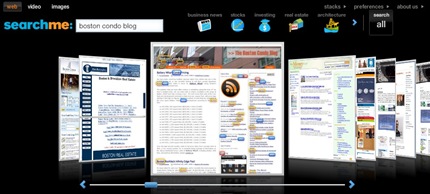With the search engine space being dominated by Google, you might think that there is no room for further innovation in the arena, however, over the past several months, new search engines have arisen that put a unique spin on how you find websites. Two of those search engines, described below, make a significant departure from the list-based search engine results pages (SERPs) that are characteristic of Google (Yahoo, and MSN).
SearchMe: Visual Search
SearchMe is a relatively new (still in beta) search engine that has a slick and easy to use interface that is visually stunning. After typing in a search phrase, the user is presented with screen shots of (hopefully) relevant websites that can be flipped through as though you were flipping through whole page advertisements while reading a magazine. The typical text based results of page titles that you would see on a standard SERP can be found by hovering your mouse over the top of one of the screenshots. Perhaps one of the only significant drawbacks to this engine is the number of clicks and time needed to scan through numerous sites. Our search for Boston Condo Blog displayed us as the third “page” in the search.

Cuil Search Engine
The new (released Monday) search engine Cuil has been launched by former Google employees, and on the top of its features and benefits list is the cataloging of three times the number of webpages as Google (over 120 billion), and a unique magazine style display mechanism that is more visually intuitive than standard SERPs. Cuil is just getting off the ground, so while they have crawled a lot of sites, the actual search engine is still a little slow in returning results (perhaps due in part to their scaled down infrastructure versus that of Google), and some of the searches that we performed seemed to return too many pages from a single website (i.e. too many of the results on the “front page” were from the same website, which can be somewhat limiting). Our search for Boston Condos in Cuil displayed us as the “featured article” in the magazine style search results.

Google still remains king of the search engines, the speed of the engine, and the accuracy of the results, especially on long-tail searches (search phrases that are very specific in nature, Boston 285 Columbus Lofts Roofdeck, for instance), is unmatched. Nonetheless, Google’s reaction to the new entrants is positive, they encourage innovation in the industry, and by using a combination of search engines, including the new ones described here, offers a more robust search environment.






